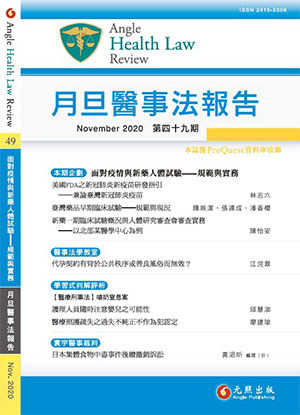全民健保自立名目與自付差額的差異【月旦時論】 試閱
The Differences between out of Pocket Payment without Authorization and Partial out of Pocket Payment with Authorization under the National Health Insurance
健保特約醫療機構能否要求健保病人自費醫療或是自費購買藥品、醫療器材,一直是一個爭議不斷的議題。就法律管制架構而言,2011年是一個分水嶺,因為在2011年之前,全民健康保險法只有禁止「自立名目」的規定,在2011年之後,禁止「自立名目」的規定還在,但是多了允許「自付差額」的規定。在臺灣這個幾乎是單一買家的醫療市場,保險人和醫療服務提供者地位並不對等,權責高度集中在健保署,健保支付政策容易受到不公平正義的挑戰。鑑於此次醫療器材定價的紛擾,可能的解決方法之一是讓定價的功能獨立於保險人之外,即醫療服務、藥物及醫療器材的價值由第三方的獨立機構鑑價,健保署作為買家再向醫療服務提供者及廠商議價,民眾即便還要「自付差額」,也不會擔心是否成了冤大頭。
Whether National Health Insurance (NHI) contracted health care services providers can request the NHI insured to pay for services out of their own pockets or purchase drugs or medical devices out of their own pockets has always been a contentious issue. In terms of legal control framework, year 2011 is water shed. Before 2011, the National Health Insurance Act (NHI Act) explicitly prohibits out of pocket payment without authorization. After 2011, the provision prohibiting out of pocket payment without authorization still exists but the new provision allowing partial out of pocket payment with authorization has been amended to the NHI Act. The health care market in Taiwan is a nearly single buyer market. Due to the reality that the power and authority is highly vested in the National Health Insurance Administration (NHIA), the insurer and the health care services providers are not based on equal footings. As such, the NHI reimbursement policies have always been criticized to be unjust. In light of the recent pricing fuss of medical devices, one of the possible solutions is to separate the pricing function from the insurer. The values of health care services, drugs and medical devices are determined by an independent third party. The NHIA as a buyer can then negotiate payment schedule with health care services providers and manufacturers. Under this mechanism, the insured will not worry about being over charged when they need to pay out of their own pocket.
113-124






